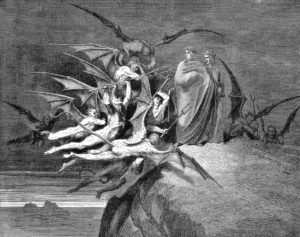Dante’s life and works
Dante Alighieri was an Italian poet, prose writer, literary theorist, moral philosopher, and political thinker. He was born in Florence in May 1265. His family was of an old lineage, of noble birth but no longer wealthy. His education was undoubtedly typical of all the youth of that time and station in life. Dante studied at the University of Bologna, one of the most famous universities in the medieval world. There, he came under the influence of one of the most famous scholars of the time, Ser Brunetto Latini, who never taught Dante but advised and encouraged him. Latini appears in Canto XV of the Inferno.
 Dante’s public life began when he bravely fought in a battle at Campaldino in 1289. By 1295, he was completely involved in political causes and was elected to the City Council that year. Florence, at that time, had two political parties: the Guelphs, who supported the pope as the ruler of the Catholic Church but believed that he should not be involved in secular affairs; and the Ghibellines, who believed the pope should rule both secular and religious factions. As a member of the Guelph political party, Dante was sent often on missions to arrange peace between the two warring parties. While on a mission to Rome to arrange a truce between the two parties, trumped-up charges were made against Dante: He was charged with graft, intrigue against the peace of the city, and hostility against the pope. He was fearful for his life, and he did not appear to answer the charges. A heavier penalty was imposed. All of his property was confiscated, he was sentenced to be burned at the stake if caught, and his two sons were banished with him. In 1302, he was exiled from his native city, never to return.
Dante’s public life began when he bravely fought in a battle at Campaldino in 1289. By 1295, he was completely involved in political causes and was elected to the City Council that year. Florence, at that time, had two political parties: the Guelphs, who supported the pope as the ruler of the Catholic Church but believed that he should not be involved in secular affairs; and the Ghibellines, who believed the pope should rule both secular and religious factions. As a member of the Guelph political party, Dante was sent often on missions to arrange peace between the two warring parties. While on a mission to Rome to arrange a truce between the two parties, trumped-up charges were made against Dante: He was charged with graft, intrigue against the peace of the city, and hostility against the pope. He was fearful for his life, and he did not appear to answer the charges. A heavier penalty was imposed. All of his property was confiscated, he was sentenced to be burned at the stake if caught, and his two sons were banished with him. In 1302, he was exiled from his native city, never to return.
 It is not known where he spent many of his years in exile, but he was often well received. He began his great poem, The Divine Comedy. He wrote Divine Comedy which is one of the most important poems of the Middle Ages and the most influential literary work in Italian. Dante’s Divine Comedy presents a profound Christian vision of humankind’s temporal and eternal destiny. He mostly used vernacular in literature while most poetry was written in Latin. Also, his use of the Florentine dialect helped establish the modern-day standardized Italian language. Not only did he lend a voice to the emerging lay culture of his own country, but Italian became the literary language in western Europe for several centuries.
It is not known where he spent many of his years in exile, but he was often well received. He began his great poem, The Divine Comedy. He wrote Divine Comedy which is one of the most important poems of the Middle Ages and the most influential literary work in Italian. Dante’s Divine Comedy presents a profound Christian vision of humankind’s temporal and eternal destiny. He mostly used vernacular in literature while most poetry was written in Latin. Also, his use of the Florentine dialect helped establish the modern-day standardized Italian language. Not only did he lend a voice to the emerging lay culture of his own country, but Italian became the literary language in western Europe for several centuries.
In addition to poetry, Dante wrote important theoretical works ranging from discussions of rhetoric to moral philosophy and political thought. He died in Ravenna on September 13, 1321, and he was buried with honors due him. Even though he is dead, his influential works and his unique usage of language still have an impact on the world of literature. Dante is always described as the “father” of the Italian language, and he is called one of the “three crowns” with other influential names including Petrarch and Boccaccio.
Do you want to know more about Dante’s life and works and other famous exponents of Italian literature? Take a look at the following page!



